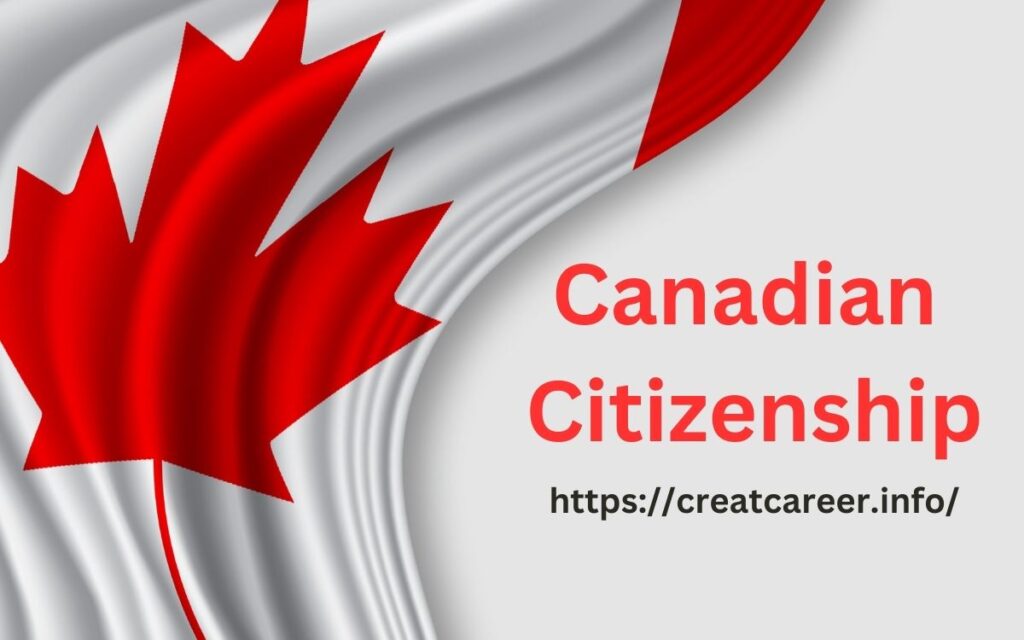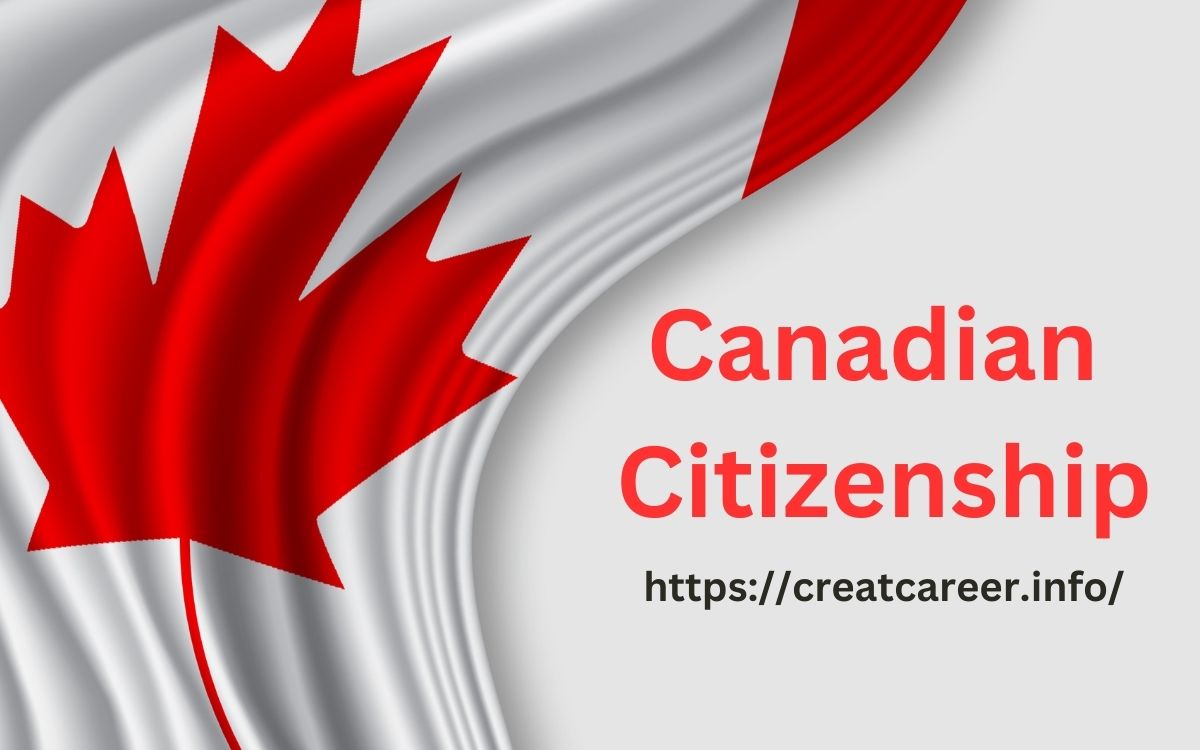Applications for Canadian citizenship are now accessible online.
People will be able to apply for Canadian citizenship online thanks to a new platform that the Canadian government will introduce in August 2021. Here is a link to the new online application gateway. As part of the Canadian government’s effort to further digitize the immigration process, this comes after the implementation of online citizenship tests during the COVID-19 epidemic.
What is citizenship in Canada?
One of the most sought-after citizenships in the world is Canadian citizenship, and it is simple to see why. Canadian citizens have access to one of the most prosperous nations in history to construct their lives and careers. To find out everything you need to know about gaining Canadian citizenship, check out our list of frequently asked questions.
The process of getting Canadian citizenship through naturalization will be the focus of this essay.

Who is a citizen of Canada?
A person is a citizen of Canada if they:
- were Canadian citizens;
- naturalized and became a citizen;
- were born outside of Canada and had at least one parent who was a citizen of Canada at the time of birth, either by birth or by naturalization;
- were born outside of Canada to a Canadian parent who was likewise born outside of Canada to a Canadian parent on or after January 1, 1947, up to and including April 16, 2009; or
- were adopted by a Canadian parent from outside Canada on or after January 1, 1947.
What prerequisites must one meet to become a citizen of Canada?
Candidates who wish to naturalize as Canadian citizens must:
- possess the following requirements: be a permanent resident; have lived in Canada for at least three years (1,095 days) out of the last five years
- have filed personal income taxes for at least three years within the last five years,
- if required by the Income Tax Act;
- show proficiency in English or French (if between the ages of 18 and 54, inclusive);
- and not be subject to a removal order.
What benefits come with becoming a citizen of Canada?
Many rights are granted to those who are Canadian citizens. Canadian citizens also have the following rights in addition to those enjoyed by permanent residents of Canada, including the freedom to dwell and work anywhere in Canada:
Election rights in Canada include the ability to vote in national, provincial, and local elections, run for office, come and exit the country at will without accruing residency days to retain status, and get a Canadian passport, one of the most prized in the world.
A child born to a Canadian citizen is also automatically a Canadian citizen, regardless of where the child is born. And finally, since a Canadian citizenship certificate is perpetually valid, citizens are exempt from the obligation to renew their immigration documents.
What legal differences exist between Canadian and foreign naturalization laws?
Canada’s citizenship naturalization procedure is among the most open in the world, if not the most. Canada permits residents to apply for citizenship in a shorter amount of time than in other nations, often much less time, and does not need new citizens to declare their intention to live in the state. The laws of Canada provide non-citizen residents to live and work with flexibility while making plans to eventually become citizens by meeting a system of specific, measurable requirements.
The citizenship laws of Canada are contrasted with those of other nations.
| Country | Citizenship requirements |
|---|---|
| Canada | 3 years of permanent residence |
| United States | 5 years of permanent residence |
| United Kingdom | 5 years of permanent residence |
| Australia | 4 years of permanent residence |
| New Zealand | 5 years of permanent residence |
| Ireland | 5 years of permanent residence |
| Germany | 8 years of permanent residence |
| France | 5 years of permanent residence |
| Spain | 10 years of permanent residence |
| Italy | 10 years of permanent residence |
Note: Data acquired in October 2017 were used to construct the table above. The correctness of the data in the table cannot be guaranteed by creatcareer.info.
I want to apply for Canadian citizenship, but do I need to apply for permanent residence first?
All naturalized Canadians are required to first apply for and be granted Canadian permanent resident status, with the exception of a few extremely unusual instances involving overseas adoption. Information about the distinctions between citizenship in Canada and permanent residency can be found here.
Under its immigration programs, which allow individuals and families to become permanent residents, Canada welcomes immigrants from all over the world. Please visit our Book an Immigration Consultation page if you have questions about your options or if you have temporary residency in Canada and want to apply for permanent residency.
Does Canada permit dual nationality?
Canada does indeed permit dual (or multiple) citizenship. This implies that fresh Canadian citizens can take advantage of their citizenship rights while still keeping their citizenship in another nation, if that nation permits dual citizenship.
Do I need to have plans to live in Canada to apply for citizenship?
No, naturalized Canadian citizens are not required to have a permanent residence plan after becoming citizens. It used to be the other way around, however this rule was removed in 2017.
If I marry a Canadian, do I then become a Canadian?
No, if you marry a Canadian citizen, you won’t automatically become a Canadian citizen. See our spousal sponsorship article for more information. If your spouse, a Canadian citizen, can sponsor you to become a permanent resident, you may then be eligible to apply for citizenship. Alternately, you can use another method (such an economic immigration program) to petition for permanent residence.
What occurs if I don’t pass the citizenship exam?
People who take the citizenship test and don’t pass it the first time but still match the requirements for citizenship will be requested to take it again 4–8 weeks later.
The Canadian government will invite the applicant to attend for a hearing with a citizenship officer if the second test is also unsuccessful. The officer may test the applicant’s knowledge of Canada, inquire about his or her residency in Canada, and judge the applicant’s proficiency in English or French in order to determine whether the applicant satisfies the conditions for citizenship.
What happens at the citizenship ceremony in Canada?
Attending a ceremony and saying the Oath of Citizenship are requirements for new citizens. You acquire Canadian citizenship after the oath is taken. Each new citizen is given a citizenship certificate with a date as identification. Citizens-to-be must attend the ceremony and take the oath if they are at least 14 years old. Children under the age of 14 are invited but not obligated to attend.
All around Canada, citizenship ceremonies are held throughout the year. These happy events bring together members of the Canadian family from all around the world.
A guide on getting ready for the citizenship ceremony is available online from the Canadian government.
